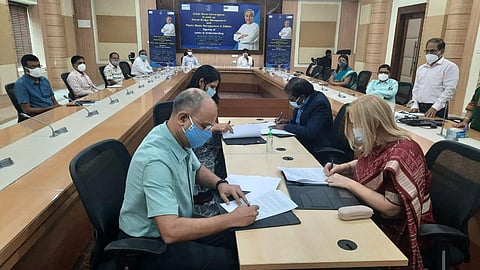

BHUBANESWAR: The Odisha government on Tuesday roped in Unicef and Centre for Policy Research (CPR) for urban-rural convergence on Faecal Sludge and Septage Management (FSSM) and Plastic Waste Management (PWM).
A Letter of Understanding (LoU) was signed between the departments of Housing and Urban Development (H&UD) and the Panchayati Raj and Drinking Water (PR&DW) and Unicef and CPR.
The initiative aimed at strengthening the efforts of both departments to ensure district-wide FSSM and PWM through urban-rural convergence will be piloted in seven districts in the first phase.
It will be scaled up to other districts basing on the outcome in Angul, Balasore, Dhenkanal, Ganjam, Khurda, Mayurbhanj, and Sambalpur districts during the pilot phase.
Minister for PR&DW, Law, and H&UD Pratap Jena said while decentralised waste management has been implemented across 114 Urban Local Bodies (ULBs), the new intervention will help the rural population avail sanitation facilities located in the nearby urban areas.
The Gram Panchayats will now be tagged to urban facilities like faecal sludge treatment plants (FSTPs) and material recovery facilities for effective faecal sludge and plastic waste management. The initiative will strengthen both Panchayatiraj Institutions (PRIs) and ULBs to ensure the prevention of river and groundwater pollution, the Minister informed.
The State government has already operationalised 58 FSTPs and all ULBs will be covered with 118 functional plants by March 2022. Wealth Centres have been established in each ULB comprising both Micro Compost Centres (MCCs) and Material Recovery Facilities (MRFs) for the management of solid waste including plastic waste. So far, 167 MRFs have been made functional in the State through SHGs.
Chief Secretary Suresh Chandra Mahapatra said the State has made substantial progress in both FSM and SWM in recent years. The convergence will help provide better sanitation facilities to rural populations and result in optimum utilisation of urban infrastructures, he said.
Principal Secretary of PR&DW Ashok Kumar Meena said the new urban-rural convergence model will accelerate the process to achieve ODF sustainability besides effective management of faecal and plastic waste in the State.
"The Department has already notified Odisha Rural Sanitation Policy in 2020 which underscores adoption of safe and scientific management of solid waste with a special focus on plastic waste and liquid waste management," he added.
The H&UD department in communication in May had directed all districts to ensure urban-rural convergence and leverage on the FSM and plastic waste management facilities located in adjacent urban areas.
Principal Secretary of H&UD G Mathi Vathanan said the convergence will promote better public health by combating pollution of water bodies and land. The initiative being piloted in seven districts will be extended to all 30 districts within a year, he said.
President of CPR Yamini Aiyer and Chief Field Officer of Unicef Odisha Monika Nielsen hoped that the model would emerge as a best practice for the entire country to learn and emulate.
Director of Municipal Administration (DMA) and Mission Director (SBM-U) H&UDD Sangramjit Nayak sought the support of all key stakeholders in the districts, ULBs, and PRIs on this pathbreaking initiative which is a first-of-its-kind initiative in the Country.
Collectors, PD-DRDA, PD-DUDA, Commissioners, Executive Officers, BDOs, and other key officials from the seven districts participated through Video conferencing.